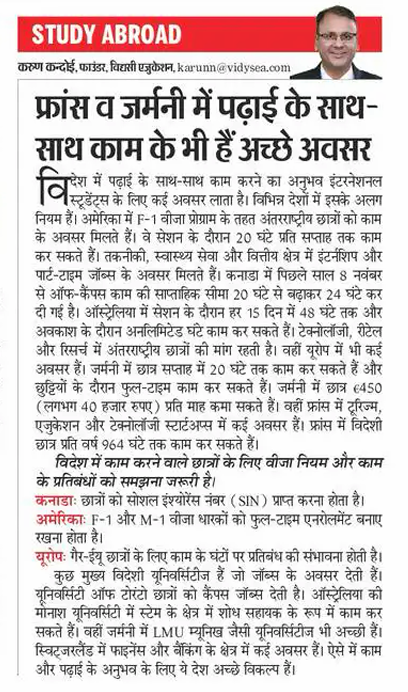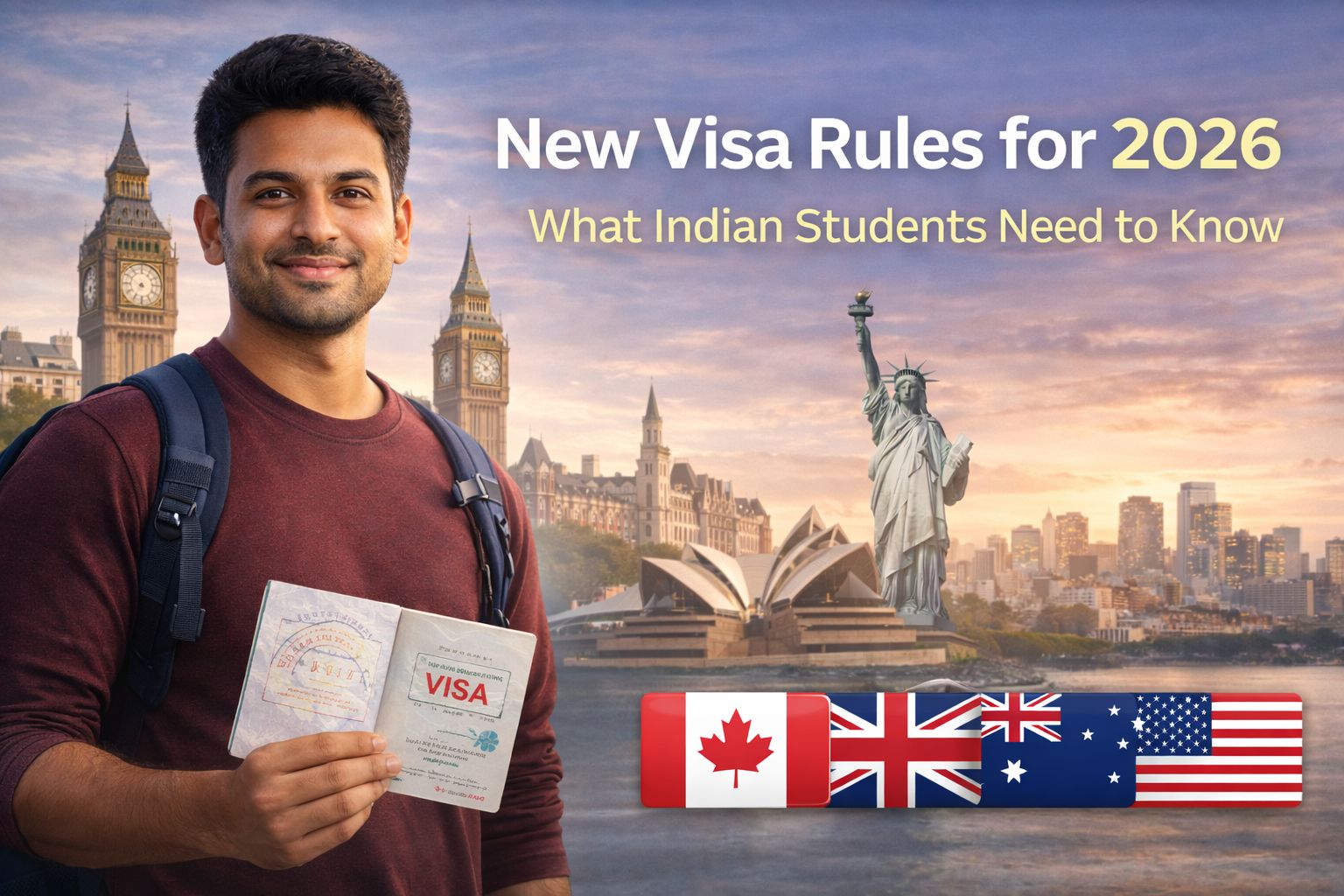Work While You Study Abroad: A Comprehensive Guide
Thinking about working while studying abroad? It’s more than just a way to earn extra income—it’s a gateway to building global work experience, expanding your network, and boosting your career prospects. From Canada’s flexible work policies to Germany’s industry-focused internships, every country offers unique opportunities. Discover how you can legally work, balance academics, and unlock long-term career benefits while studying overseas. Ready to make the most of your study abroad journey? Read on to explore your options!
Team Vidysea
January 31, 2026

Understanding Work Opportunities While Studying Abroad
The prospect of working while studying abroad opens up exciting possibilities for international students. Not only does it provide financial support, but it also offers invaluable professional experience and cultural immersion. Let's explore how different countries approach student employment and what opportunities await you.
United States: Balancing Academics and Work
The United States offers structured work opportunities for international students under the F-1 visa program. Students can work up to 20 hours per week during academic terms, focusing on both on-campus and off-campus opportunities. The technology, healthcare, and finance sectors frequently offer internships and part-time positions that align with academic programs. Research assistantships, teaching positions, and campus employment provide excellent starting points for professional development.
Canada: Flexible Work Arrangements
Canada stands out for its generous student employment policies. Canada has raised the weekly off-campus work limit for international students from 20 to 24 hours, effective November 8, 2024. The strong minimum wage laws and inclusive work environment make it particularly attractive. The country's post-graduation work permits and pathway to permanent residence add long-term value to the study-work experience.
Australian Work Culture and Student Life
In Australia, international students can work up to 48 hours per fortnight during term time and unlimited hours during breaks. The country's robust minimum wage structure ensures fair compensation. Industries ranging from retail and hospitality to technology and research actively seek international student talent. The work culture emphasizes work-life balance, making it easier to manage academic commitments alongside employment.
European Opportunities: Germany, France, and Beyond
European countries offer diverse work opportunities with their own distinct advantages. Germany allows students to work up to 20 hours per week without additional permits, with strong connections to industrial internships. Also, they are free to take full-time employment during vacations. France combines work opportunities with cultural immersion, particularly in sectors like tourism, education, and technology startups. French law allows foreign students to work up to 964 hours per year, or the equivalent of 60% of the maximum working hours permitted. To secure a job, having a good command of the German language is highly beneficial, as well as gaining practical experience through internships during your studies.
In Germany, students can earn up to €450 (~US$491) per month tax-free. If you exceed this amount, you'll receive an income tax number, and automatic deductions will be applied to your salary. Some employers may withhold tax even for lower earnings, but you can easily reclaim it by submitting your annual income tax statement.
The emphasis on industry-relevant experience makes European work opportunities particularly valuable for career development.
Navigating Work Restrictions and Requirements
Understanding visa regulations and work restrictions is crucial for international students. Different countries impose varying limits on weekly work hours, types of permitted employment, and requirements for additional work permits. Maintaining compliance while maximizing work opportunities requires careful planning and awareness of local regulations.
International students in Canada, the US, and Europe have opportunities to work part-time while studying, although with varying regulations. In Canada, students must secure a Social Insurance Number (SIN) and can work to offset costs and gain experience. In the US, F-1 or M-1 visa holders need to maintain full-time enrollment and meet financial requirements to work. Meanwhile, in Europe, work regulations differ by country, with non-EU students sometimes facing restrictions on hours or types of employment. Despite these differences, part-time work remains a common way for students to support themselves while pursuing their education.
Maximizing Your Work-Study Experience
Balancing work and study abroad requires a thoughtful approach to time management and career planning. Many top universities and countries provide excellent support systems for international students seeking part-time work. For example, the University of Toronto in Canada offers a robust work-study program where students can take on campus jobs that align with their academic schedules. Similarly, Australia's Monash University provides opportunities for research assistantships, particularly in STEM fields, helping students gain relevant experience while managing coursework.
University career centers are vital resources for job searches, resume building, and networking. In countries like Germany, universities such as LMU Munich provide career services specifically tailored to international students, offering job boards and mentorship programs to help students secure roles that complement their studies.
Making an Informed Decision
When choosing a study destination, it's crucial to consider both academic programs and work opportunities. Countries like Germany are popular for their low tuition fees and the ability for students to work up to 20 hours per week. Universities such as Heidelberg University and RWTH Aachen University are known for offering part-time research assistant positions that align with academic pursuits.
In contrast, if you prioritize higher wages, Switzerland offers some of the best-paying part-time roles for students, particularly in industries like banking and hospitality. ETH Zurich, for instance, provides exceptional resources for students balancing academic commitments and work opportunities.
The Bigger Picture: Long-Term Impact
Work-study experiences aren’t just about earning money—they’re about laying the foundation for your future career. Many countries, such as Canada and the Netherlands, offer post-study work visas that give students a chance to gain professional experience in their field.
Your work-study experience is what you make of it. Seek roles that align with your academic and career aspirations, build relationships with professors and peers, and leverage every resource available.
Your work today isn’t just about supporting yourself—it’s about shaping the professional you’ll become tomorrow!
Featured in Dainik Bhaskar!
We’re thrilled that Vidysea’s work in student guidance has been spotlighted by one of India’s most-trusted newspapers.

Related Articles

New Visa Rules for 2026: What Indian Students Need to Know (Country-wise Guide)

25% Growth in Global Talent Mobility: Vidysea Founder Karun on India’s Moment

The Importance of English Proficiency Tests for Indian Students Pursuing Overseas Education and Student Visa Applications